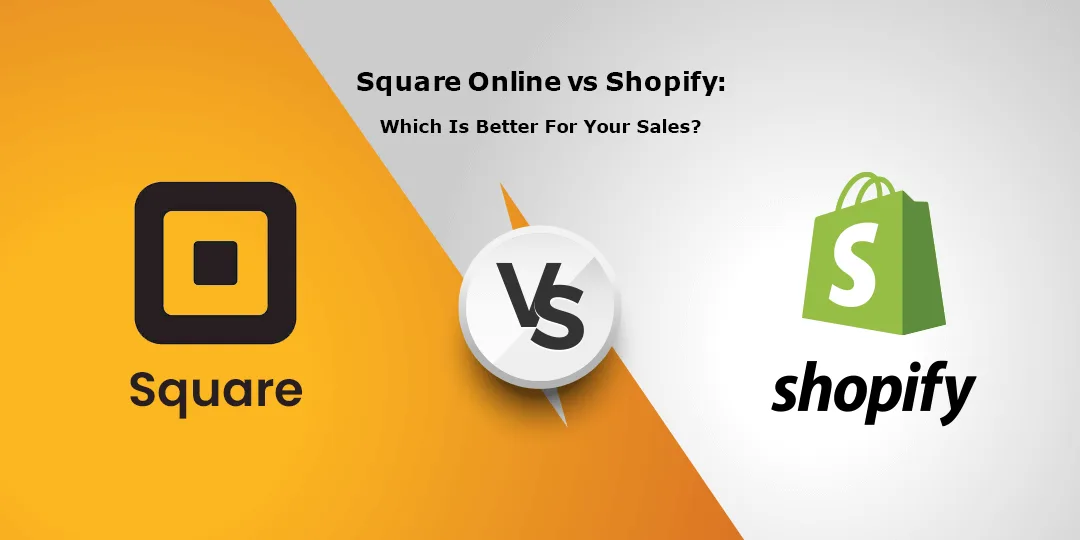With the rapid expansion of the eCommerce industry and the increasing number of online startups, there has been a surge in the competition among eCommerce platforms to provide unparalleled services and establish themselves as the go-to platform for online businesses.
eCommerce platforms constantly strive to improve their offerings and provide exceptional features and benefits to their customers, to stand out in this highly competitive market. This has significantly increased the quality of services these platforms provide, benefitting businesses and consumers.
In our previously created Magento Vs. Shopify blog, we explored the differences between these two eCommerce platforms and concluded which was better. Our goal was to provide readers with a comprehensive overview of each platform’s capabilities and features so they could make an informed decision when choosing the best option for their online store.
Today we are here with another such informative blog in which we will be discussing Shopify Vs. Square Online and conclude which one is better for boosting your business sales.
Shopify Vs. Square Online: Pros and Cons
1. Shopify Pros and Cons
(a) Shopify Pros
- Shopify knows what an eCommerce business owner and an eCommerce customer want to feel while browsing or buying from an eCommerce store. Shopify’s every service revolves around its eCommerce admins and customers, which is why it offers the highest customer satisfaction than any other eCommerce platform.
- With Shopify, you can access robust sales features to boost your store’s growth. From multi-channel integrations to dropshipping and beyond, the platform provides an extensive range of Shopify tools and apps.
- Shopify themes are expertly crafted to deliver the perfect blend of form and function. These themes offer a wide range of features that can be fully customized to meet your specific needs and preferences.
(b) Shopify Cons
- No doubt that the number of apps offered by Shopify makes it the best eCommerce platform, but this is also one of the major drawbacks of Shopify. Because Shopify admins need an app for every feature if they want to upgrade or enhance their website, adding multiple apps can eventually slow down your website performance instead of boosting performance.
- As we know, Shopify supports multiple payment gateways, a plus point for businesses trading worldwide. But unfortunately, Shopify charges a commission of 2% for every transaction fulfilled via third-party payment apps instead of Shopify payments.
- Initially, Shopify’s 14-day trial was praised by millions of eCommerce startups, but the new starting price of $29 can be a bit expensive for small startups as they are already on tight budgets.
2. Square Online Pros and Cons
(a) Square Online Pros
- Square online pricing plans are affordable and offer great value for money. It also offers a free and starting plan for only $12 per month, making it budget-friendly for everyone.
- Square Online provides in-house Square integrations ideal for sellers who operate in-person and want to build an online store with a reliable POS system.
- Square Online has easy-to-use features, enabling beginners and startup admins to launch their websites without technical knowledge.
(b) Square Online Cons
- Square Online does not provide customizable templates. Hence, the startups have to work with the template chosen by Square Online.
- Unline Shopify Square Online does not support a huge range of third-party payment integrations, making it difficult for businesses that sell their products worldwide.
- Once again, unlike Shopify, Square Online does not provide many apps and tools to its users so that the eCommerce admins can upgrade their website to a certain extent only without any extensive choices of customization.
Now that we have taken a quick overview of both platforms’ pros and cons let’s go deep into each point of difference between the eCommerce platforms.
Which of them is worth the value?
Platform name | FREE | Affordable | A Bit Expensive | Very Expensive |
Shopify | 3-day FREE trial | $29 | $79 | $299 |
Square Online | FREE | $12 | $26 | $72 |
Both Shopify and Square Online offer free plans to their users.
Shopify offers a 3-day trial to its users before they confirm their decision to work with Shopify.
Square Online does not provide any free trial period, but it offers a free plan that only charges transaction fees.
Square Online offers a broad range of features in its free plans, making it a highly affordable option for startup businesses compared to Shopify. With Square Online, business administrators can sell unlimited products by syncing their Square POS, creating discount coupons, and accessing many other features for free, unlike other eCommerce platforms.
Overall, Square Online offers exceptional value for your investment. Its reasonably priced plans come with impressive features, although certain crucial tools like abandoned cart recovery and reviews are only accessible with the pricier plans. It’s important to note that Square Online has a 2.9% + $0.30 transaction fee, whereas Shopify’s fees range from 0.5% to 2%, depending on your selected plan. By utilizing Shopify’s in-house payment gateway, you can eliminate their fees.
Find out more
Read our Shopify Pricing Plans article to get more details about its pricing plans at the features offered with each pricing plan.
Which one is more beginner-friendly?
1. Laying the website foundation
As discussed earlier, setting up your eCommerce website is easy with Square Online. Square Online offers a speedy and simplified store setting up process as it does most of the admin’s work. The business admin needs to answer questions like your business’s general details (name, address, logo, etc.) and what color would be preferred, etc., asked at the start of the process, and viola! Your eCommerce website is ready to launch.
Whereas Shopify is much like “your store, your choice.” Shopify leaves everything to the business admin so they can work on it however they want. This is a nice feature offered by Shopify, as the business admin can work with their website however they want. But because of this, it is quite a time for business admins to ready their store for launch.
Also, Square Online provides users a one-year free domain if the admin has subscribed to one of its annual plans. Unfortunately, Shopify does not provide any similar features. Hence, customers have to figure out the domain section on their own.
2. Store Management
If you own a business with a large inventory stock to handle, it is advised to go for Shopify instead of Square Online. Shopify is optimized and built for handling large-scale businesses and their huge catalogs.
If you are a small business owner, you can go with Square Online, an affordable, speedy and easy-to-use platform. Your small-scale business will be handled easily.
Which one offers better website templates?
As stated previously, Square Online creates a website based on the answers answered to the questions. The eCommerce platform provides multiple options for color palettes and different types of website styles like modern, elegant, strong, classic and playful.
On the other hand, Shopify offers a whole theme library to the admins, so they can choose any of the themes they want from the huge theme list. Shopify has both free and paid themes for admins to choose from.
In conclusion, Shopify offers more themes compared to just five theme styles.
To make your work easy
Read our Best Shopify Themes for SEO, and choose the right theme to benefit your business and SEO.
Which one offers better sales tools?
Shopify | Square Online | |
No. of products admins can add | Unlimited | Unlimited |
Supported omnichannel sales | Facebook and Facebook Messanger, Instagram, Pinterest, Buzzfeed, Amazon, eBay, Wanelo, Kik, Houzz | Instagram and Facebook Ads |
Supports Dropshipping | ✅ | ❌ |
Supports Bulk Product import | ✅ | ✅ |
Inventory Management | ✅ | ✅ |
Abandoned Cart Recovery | ✅ | ✅ |
Supported Guest Checkout | ✅ | ✅ |
Allowed to add product variants | ✅ | ✅ |
Checkout page customization | ✅ | ❌ |
Allows invoice customization | ✅ | ❌ |
With this table, you can clearly see that Shopify surpasses Square Online in enhancing sales capabilities. With Shopify, you can enjoy the advantage of customizable invoices that offer a consistent brand experience.
Moreover, Shopify allows you to tailor checkout pages, customer logins, and multiple integrations across various channels. While Square Online is perfect for small or local businesses, Shopify excels in helping your business stand out and achieve sustainable growth in the long run.
Who offers more Payment Options?
If you have researched Shopify, you must be aware that there are 100+ options that Shopify allows admins to add payment gateways to Shopify store.
- Apple Pay
- PayPal
- Amazon Pay
- Google Pay
- Stripe
- Buy Now, Pay Later
- Cash on Delivery
- Shopify Payments
- Shop Pay, etc.
Whereas Square Online supports a countable amount of payment options, like,
- PayPal
- Apple Pay
- Stripe
- Google Pay
- All major credit and debit cards
With this, Shopify offers more payment options than the Square Online platform, which can benefit stores with a huge international customer base.
Now for transaction fees, both Shopify and Square Online charge transaction fees for every transaction made from their platform. The transaction fee depends on the plan chosen by you. However, Shopify does not charge any transaction fee if it is made from its payment gateway. At the same time, Square Online does not have any such feature.
Shopify Starter Plan | Shopify Basic Plan | Shopify Regular Plan | Shopify Advanced Plan | Shopify Plus | |
Online Credit Card Processing Fees | 5% + $0.30 | 2.9% + $0.30 | 2.6% + $0.30 | 2.4% + $0.30 | 2.15% + $0.30 |
In-person Credit Card Sales | 2.7% | 2.7% | 2.5% | 2.4% | Varies |
To know more about Shopify Payments
Refer to our Shopify Pricing Plans informative blog, where you will find in-depth details of all Shopify plans and features offered with each plan. It will be easy for you to opt for the ideal plan.
Who has better marketing features to help you promote your online store?
Shopify and Square Online are quite similar to each other in the SEO and marketing aspects. Both platforms offer the major SEO features that the admin needs for business promotion and further customization.
Shopify | Square Online | |
Meta title customization | ✅ | ✅ |
Meta Desc. customization | ✅ | ✅ |
Mobile-friendliness | ✅ | ✅ |
Image ALT Tags customization | ✅ | ✅ |
URL customization | ✅ | ✅ |
Supports Google Analytics | ✅ | ✅ |
301 redirects | ✅ | ✅ |
SEO prompts | ✅ | ✅ |
Keyword Support | ✅ | ❌ |
Specialized SEO Apps | ✅ | ❌ |
For content marketing and blog posting, Shopify allows its admins to add blogs to Shopify store, but Square Online does not support the blog feature on its platform.
Hence, we can unbiasedly state that Shopify is the winner at this point.
For email marketing, it is hard to call either of the best platforms, as both platforms provide the same feature. It is just that Shopify offers more third-party app integration for email marketing than Square Online.
Shopify | Square Online | |
Has an in-built marketing tool? | ✅ | ✅ |
Provides live social media feeds? | ✅ | ✅ |
Supports social media integration? | ✅ | ✅ |
Supported third-party apps | MailChimp, Soundest, Rare.io, Remarkety, Aweber, SmartrMail, Constant Contact, Klaviyo | MailChimp |
Who offers high security and privacy?
For this point, you do not have to worry about any of the platforms because both platforms provide high-level security. Both the platforms are totally abided by PCI DSS and have free in-built SSL.
Shopify provides internal fraud analysis services to its users. The Basic Shopify plan offers fraud analysis indicators and support for third-party fraud apps. However, the Shopify plan and higher-level plans provide fraud analysis indicators, support for third-party fraud apps, and fraud recommendations. Opting for Shopify Payments offers complete features, regardless of your selected plan.
Again, the winner is Shopify here.
Final Verdict
Upon conducting a thorough comparison between Square Online and Shopify, we have concluded that Shopify is the superior choice overall. This platform boasts impressive versatility, making it an ideal option for a wide range of stores, from newly established businesses to larger enterprises seeking to expand their reach.
Shopify’s features and capabilities are particularly noteworthy, providing ample support for businesses’ growth and development. We highly recommend Shopify for those seeking a reliable and comprehensive e-commerce platform.
If you choose Shopify and want to move further, hire Shopify developers and customize your store per your needs. Or if you have built your store but are facing some minor queries, you can easily contact us or reach us via our official Facebook page.
Happy Reading!!!






